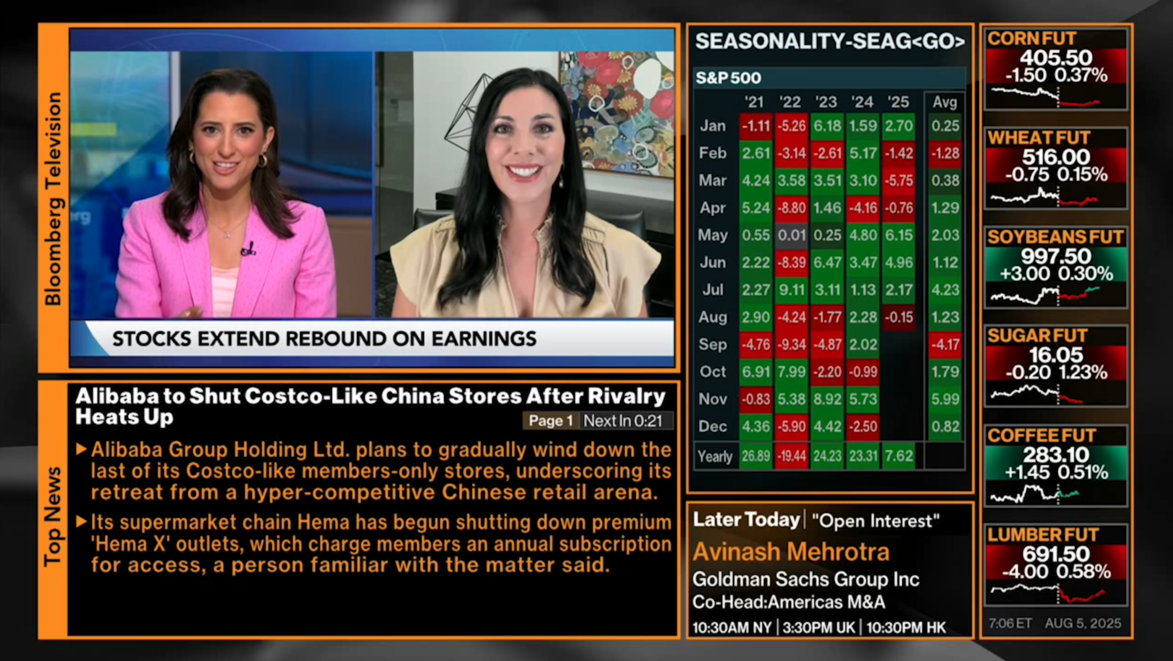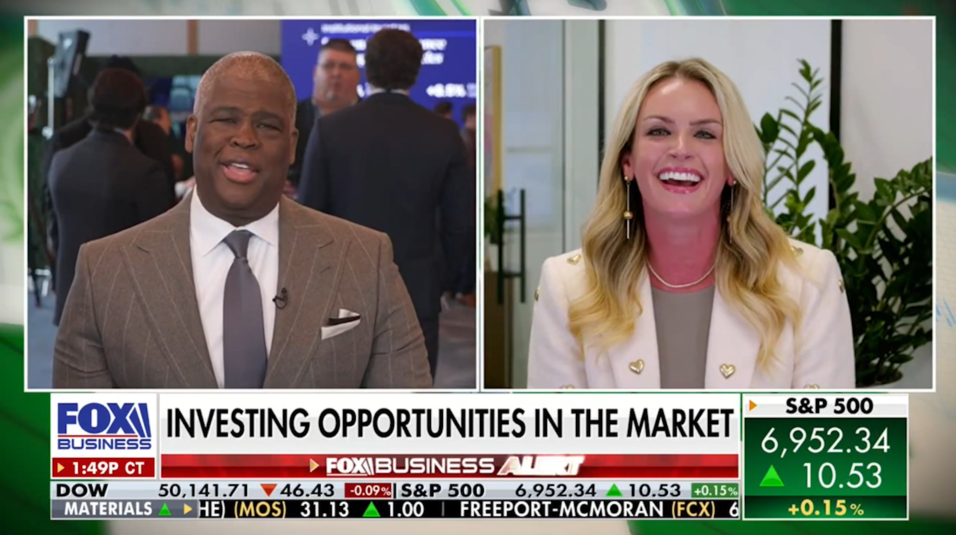Tech earnings are looking strong, but that’s not the only story catching investors’ eyes this week.
Tariffs are top of the news again.
As we’ve seen earlier this year, headlines move markets, but we’ve also seen policies soften. Many CEOs and CFOs are also saying they’ve adapted to higher tariffs.
Watch Brooke May, CFP®’s Bloomberg interview to learn how companies are adapting to tariff impacts.
Transcript:
We begin this hour with stocks gaining following robust corporate earnings. Brooke May of Evans May Wealth writing, “technology has resumed market leadership… we saw AI hype translating to earnings.” Brooke joins us now for more. Brooke, we did see a pretty amazing proclamation coming out of Palantir yesterday. And it fueled a lot of these expectations for more of the same.
How much more can they deliver versus some of the questions people have about valuations that are getting pretty lofty?
Good morning, Lisa. Yeah, we think that it’s all about earnings right now. And it’s all about tech earnings. When you look at the earnings of the companies that have reported, specifically the Mag 7, in the tech space, 26% earnings growth year-over-year compared to only 4% earnings growth that we’ve seen in the other 493 names.
So we’ve got more tech companies ready to report. We’ve got Nvidia coming up here in a few weeks and all eyes are on tech because that’s the leadership. And we think that it will continue to lead the way. Meanwhile, we’ve seen a number of different Wall Street firms come out and say maybe things are looking a little frothy.
We saw that from Michael Hartnett over at Bank of America. Morgan Stanley, Deutsche Bank and Evercore ISI analysts all said they could see a correction in the next few weeks and months ahead.
Typically, a soft period in the equity market and things have gotten pretty heady. What’s your take on that? I mean, is that something that you’re expecting and kind of waiting for?
When you look last week prior to the correction that we saw, the VIX was only around 15. And that’s nearing complacency. And if you’re contrarian at all, that’s a concern. You know, this tends to be the time of the year where the market peaks. August. And we tend to see some choppiness in the market starting in September.
Typically, it’ll bottom in October and then move higher through year end. Knowing what we know today. That trend wouldn’t surprise us. However, what we’ve seen in the last year is that the market’s moving more on headlines than it is actually on data. And so, we don’t know what headlines are going to come out over the next few weeks.
That said, knowing what we know today, we would expect to see some choppiness come September October.
When it comes to the earnings, what have you learned in terms of, especially the remainder 493 outside of the Mag 7, what have you learned in terms of the tariff impact and how corporations are really just guiding through them?
I don’t think anyone expected to see the profit margins that we’re seeing. They’re above a five-year high at 12.3% at the companies that have reported thus far. And when we listen to earnings calls, CEOs and CFOs are telling us that they’ve been able to navigate higher tariffs. They’ve been able to cost cut. They’ve been able to improve their supply chain, and they’ve been able to pass on higher prices.
So, what we’re hoping is that the tariffs will be absorbed along the way, some by retailers, some by manufacturers and some by passing it on to the consumer. And if you spread out that pain, nobody really feels it. And it doesn’t become detrimental to one area of the economy.But of course, for the previous earnings period, it was a 10% tariff on all these trading partners.
What do you think it means now that a lot of these countries are facing higher rates?
We think ultimately, we’re going to end in a range of 10% to 15%. So, if we’ve learned one thing over the last few months, there’s a lot of saber rattling. And then ultimately things end up settling at a lower level than what’s initially threatened or proposed.
So, we think that we will see some volatility based on projected tariffs. However, ultimately, once there’s more clarity and things have settled, then we think that will be in the 10% to 15% range, which has an impact, but it isn’t necessarily going to be devastating to the economy.
Brooke, how much are you paying attention to the policy uncertainty around the Bureau of Labor Statistics and the firing of the head of that?
Ray Dalio came out with a post on X saying that he actually would have fired the head of the BLS, too. Not for political reasons, but just because the data collection and the whole process of extrapolating some of the figures had become outdated. What’s your view of how this is being cast and the potential risk in markets? Well, the markets don’t like uncertainty and the sooner there’s clarity, the better off we’ll be.
It is surprising, though, and learning a little more about how the labor statistics are calculated, that so much of it is manual. And so, I wouldn’t be surprised if there is a better way to automate it. And, to gather that information more timely and with, you know, utilizing electronics instead of, you know, manual surveys. But, you know, to see a revision down of 258,000 jobs for May and June is astonishing.
And granted, we’ve seen bigger and bigger discrepancies between what’s initially reported and then the revisions. So, we need to have those numbers tightened up. And I think the best way to do it is to rework the system and come up with something that’s a lot more efficient.
Brooke May of Evans May Wealth, thank you so much for being with us this morning.




